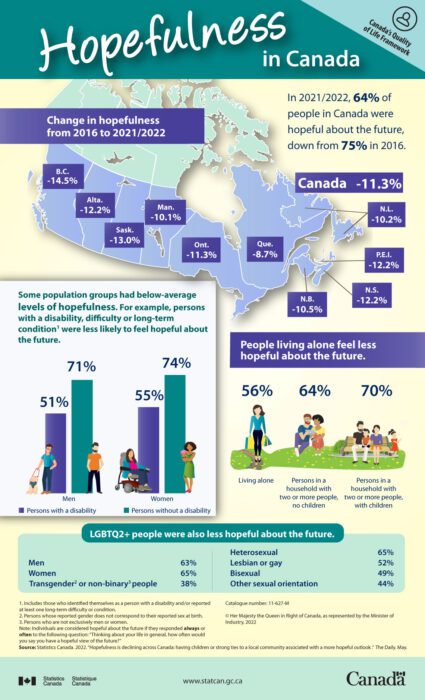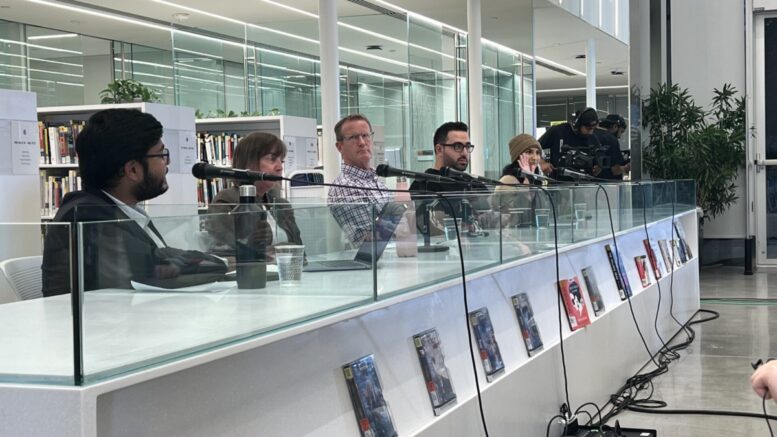A panel discussion was held at Centennial College’s Story Arts Centre on Tuesday to address how to engage youth in the democratic process and quell the concerns of “doomers.”
A “doomer” is someone who believes that societal collapse is imminent and that nothing can be done to prevent it. The collapse can occur in several ways, from global warming to nuclear war, to an unaffordable future.
“I sympathize because opening the news every day, it feels like the world is getting worse and worse,” said panellist Jad El Ghali, of Future Majority, an organization that gives voice to the political interests of young Canadians. “You are just waiting for that glimpse of hope.”
The panel was moderated by Akrit Michael, a digital producer at the Toronto Star, and focused in part on why young voters weren’t showing up at the polls.
For doomers, civic responsibility is not prioritized because of a lack of faith in the democratic system. But it’s more than just doomers who are opting out.
A Statistics Canada survey shows that Canadians aged 18 to 34 make up 26 per cent of Canada’s population, making them the biggest voting bloc. Despite the strength in numbers, just 54.19 per cent of them actually vote, when the national average is 67 per cent.
Boomer, meet Doomer
Hope for the future seems to be on the decline overall: According to Statistics Canada, Canadians have seen a 11.3 per cent dip in hopefulness since 2016.

However, Toronto Star city hall bureau chief, David Rider, said that there has always been hope.
“There have been so many issues before that have been solved,” Rider said, making mention of apartheid in South Africa, and how the people were responsible for making a change.
“And I just have to believe that as terrible as the climate crisis is … if everyone gets involved and doesn’t give up or into doomerism, then we can do it.”
Involvement according to the panellists, means voting, and engaging with politicians.
“You hold the balance of power if you rise up and you vote,” Mary-Margaret McMahon, former city councillor and current Beaches-East York MPP, said. “Get your friends, neighbours, enemies, anyone you know to vote. That will make a difference.”
El Ghali agreed. “Every vote counts,” he said. “If we all don’t have that mentality, then we’re all not gonna vote, and we all won’t have a say. That’s the problem.”
Camellia Wong, Communications Director at Future Majority, said politicians need to meet young people half-way.
“As a generation, we are disproportionately impacted by the issues we face as a society — climate change, rising cost of living, mental health crises,” Wong said in an email to the Observer.
“In order to further engage young people in politics and ensure that our generation feels empowered to change the status quo, politicians must show that they are listening to and addressing the concerns of the largest voting bloc.”
Knowledge is power (but not if you don’t know it)
The panellists said one of the issues that prevents young people from voting is a lack of education and understanding how the political system in Canada works.
“We have a severe civic literacy problem,” El Ghali said. Civic literacy is identified as one of the motivational barriers to young voters by Inspire Democracy, an Elections Canada program.
“I think there should be grade 5 students walking through [city council],” Rider said. “I can design a lesson on how something comes as an idea to city hall and how it eventually gets passed.”
McMahon said involvement in causes that matter can start even younger.
“I used to run an Eco Tigers program when [my children] were in grade one and senior kindergarten,” McMahon said. “I got really involved with my kids’ school and got them to take climate action.”
Torontonians go to the polls on Oct. 24 to vote for their mayor and city council.

